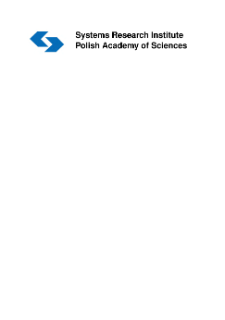- Search in all Repository
- Literature and maps
- Archeology
- Mills database
- Natural sciences
Advanced search
Advanced search
Advanced search
Advanced search
Advanced search

Object
Title: New developments in fuzzy sets, intuitionistic fuzzy sets, generalized nets and related topics. Volume II: applications * Reconfigurable hardware for fuzzy controller
Creator:
de Macedo Mourelle, Luiza ; de Souza e Silva Sandres, Paulo ; Nedjah, Nadia
Date issued/created:
Resource type:
Subtitle:
Książka = Book ; KS/4/2012/P21
Publisher:
Instytut Badań Systemowych. Polska Akademia Nauk ; Systems Research Institute. Polish Academy of Sciences
Place of publishing:
Description:
[5], 243-277 stron ; 21 cm ; Bibliografia s. 274-277
Type of object:
Abstract:
Computational system modeling is full of ambiguous situations, wherein the designer cannot decide, with precision, what should be the outcome of the system. In [29], L. Zadeh introduced for the first time the concept of fuzziness as opposed to crispiness in data sets. When he invented fuzzy sets together with the underlying theory, Zadeh’s main concern was to reduce system complexity and provide designer with a new computing paradigm that allow the to approximate results. Whenever there is uncertainty, fuzzy logic together with approximate reasoning apply. Fuzzy logic and approximate reasoning [30, 31] can be used in system modeling and control as well as data clustering and prediction [23], to name only few appropriate applications. Furthermore, they can be applied to any discipline such as finance [6], image processing [35, 9], temperature and pressure control [34, 14], robot control [11, 24], among many others. Process control is one of the many applications that took advantage of the fuzzy logic. Controller are usually embedded into the controller device. This chapter aims at presenting the development of a reconfigurable efficient architecture for fuzzy controllers, suitable for embedding. The architecture is parameterizable so to allows the setup and configuration of the controller so it can be used for various problem applications. This chapter describes the hardware implementation of a shell fuzzy controller based on generic fuzzy logic, allowing the setup and configuration for various problem situations.
Relation:
Detailed Resource Type:
Resource Identifier:
Source:
Language:
Language of abstract:
Rights:
Licencja Creative Commons Uznanie autorstwa 4.0
Terms of use:
Zasób chroniony prawem autorskim. [CC BY 4.0 Międzynarodowe] Korzystanie dozwolone zgodnie z licencją Creative Commons Uznanie autorstwa 4.0, której pełne postanowienia dostępne są pod adresem: ; -
Digitizing institution:
Instytut Badań Systemowych Polskiej Akademii Nauk
Original in:
Biblioteka Instytutu Badań Systemowych PAN
Projects co-financed by:
Access:
Object collections:
- Digital Repository of Scientific Institutes > Partners' collections > Systems Research Institute PAS > Books
- Digital Repository of Scientific Institutes > Literature > Books/Chapters
Last modified:
Oct 15, 2021
In our library since:
Aug 18, 2021
Number of object content downloads / hits:
41
All available object's versions:
https://rcin.org.pl./publication/242616

 INSTYTUT ARCHEOLOGII I ETNOLOGII POLSKIEJ AKADEMII NAUK
INSTYTUT ARCHEOLOGII I ETNOLOGII POLSKIEJ AKADEMII NAUK
 INSTYTUT BADAŃ LITERACKICH POLSKIEJ AKADEMII NAUK
INSTYTUT BADAŃ LITERACKICH POLSKIEJ AKADEMII NAUK
 INSTYTUT BADAWCZY LEŚNICTWA
INSTYTUT BADAWCZY LEŚNICTWA
 INSTYTUT BIOLOGII DOŚWIADCZALNEJ IM. MARCELEGO NENCKIEGO POLSKIEJ AKADEMII NAUK
INSTYTUT BIOLOGII DOŚWIADCZALNEJ IM. MARCELEGO NENCKIEGO POLSKIEJ AKADEMII NAUK
 INSTYTUT BIOLOGII SSAKÓW POLSKIEJ AKADEMII NAUK
INSTYTUT BIOLOGII SSAKÓW POLSKIEJ AKADEMII NAUK
 INSTYTUT CHEMII FIZYCZNEJ PAN
INSTYTUT CHEMII FIZYCZNEJ PAN
 INSTYTUT CHEMII ORGANICZNEJ PAN
INSTYTUT CHEMII ORGANICZNEJ PAN
 INSTYTUT FILOZOFII I SOCJOLOGII PAN
INSTYTUT FILOZOFII I SOCJOLOGII PAN
 INSTYTUT GEOGRAFII I PRZESTRZENNEGO ZAGOSPODAROWANIA PAN
INSTYTUT GEOGRAFII I PRZESTRZENNEGO ZAGOSPODAROWANIA PAN
 INSTYTUT HISTORII im. TADEUSZA MANTEUFFLA POLSKIEJ AKADEMII NAUK
INSTYTUT HISTORII im. TADEUSZA MANTEUFFLA POLSKIEJ AKADEMII NAUK
 INSTYTUT JĘZYKA POLSKIEGO POLSKIEJ AKADEMII NAUK
INSTYTUT JĘZYKA POLSKIEGO POLSKIEJ AKADEMII NAUK
 INSTYTUT MATEMATYCZNY PAN
INSTYTUT MATEMATYCZNY PAN
 INSTYTUT MEDYCYNY DOŚWIADCZALNEJ I KLINICZNEJ IM.MIROSŁAWA MOSSAKOWSKIEGO POLSKIEJ AKADEMII NAUK
INSTYTUT MEDYCYNY DOŚWIADCZALNEJ I KLINICZNEJ IM.MIROSŁAWA MOSSAKOWSKIEGO POLSKIEJ AKADEMII NAUK
 INSTYTUT PODSTAWOWYCH PROBLEMÓW TECHNIKI PAN
INSTYTUT PODSTAWOWYCH PROBLEMÓW TECHNIKI PAN
 INSTYTUT SLAWISTYKI PAN
INSTYTUT SLAWISTYKI PAN
 SIEĆ BADAWCZA ŁUKASIEWICZ - INSTYTUT TECHNOLOGII MATERIAŁÓW ELEKTRONICZNYCH
SIEĆ BADAWCZA ŁUKASIEWICZ - INSTYTUT TECHNOLOGII MATERIAŁÓW ELEKTRONICZNYCH
 MUZEUM I INSTYTUT ZOOLOGII POLSKIEJ AKADEMII NAUK
MUZEUM I INSTYTUT ZOOLOGII POLSKIEJ AKADEMII NAUK
 INSTYTUT BADAŃ SYSTEMOWYCH PAN
INSTYTUT BADAŃ SYSTEMOWYCH PAN
 INSTYTUT BOTANIKI IM. WŁADYSŁAWA SZAFERA POLSKIEJ AKADEMII NAUK
INSTYTUT BOTANIKI IM. WŁADYSŁAWA SZAFERA POLSKIEJ AKADEMII NAUK




































